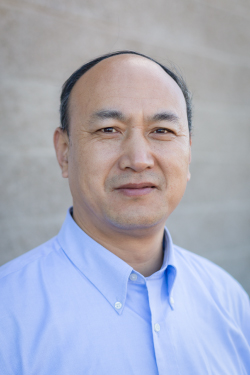Professor Chen will deliver a plenary talk at ICFCTA19, Bourges, France. 2019 International Conference on Fractional Calculus Theory and Applications (ICFCTA 2019), April 25, 2019 - April 26, 2019.\
The Talk title is "MAD (modeling, analysis and design) about variabilities: when fractional calculus meets big data and machine learning"
YangQuan Chen
Director, Mechatronics, Embedded Systems and Automation Lab
Professor, Department of Mechanical Engineering, University of California
5200 Lake Road, Merced, CA 95343, USA
Contact: yqchen@ieee.org
Abstract:
MAD stands for modeling, analysis and design. I first argue that “variability” is a defining feature of big data in its 10 “V” characteristics (Volume/Velocity/Variety/Variability/Veracity/Validity/ Vulnerability/ Volatility/ Visualization/Value). Then I suggest that to quantitatively model, analyze the variabilities, fractional calculus is required when the big data is from a complex dynamic system. I advocate the use of “fractional order data analytics” (FODA) based on fractional order signal processing (FOSP) techniques. Design for desirable level of variability is then possible based on the modeling and analysis. Examples in crop water stress drone remote sensing, networked control systems are briefly introduced as motivating real world applications. I will go a step further by suggesting a connection between fractional calculus and machine learning in two settings: deterministic case where fractional order gradient can play a positive role, while in stochastic setting, optimal randomness links to fractional order stochasticity.
About the speaker…
 YangQuan Chen earned his Ph.D. from Nanyang Technological University, Singapore, in 1998. He had been a faculty of Electrical Engineering at Utah State University from 2000-12. He joined the School of Engineering, University of California, Merced in summer 2012 teaching “Mechatronics”, “Engineering Service Learning” and “Unmanned Aerial Systems” for undergraduates; “Fractional Order Mechanics” and “Nonlinear Controls” for graduates. His research interests include mechatronics for sustainability, cognitive process control, small multi-UAV based cooperative multi-spectral “personal remote sensing”, applied fractional calculus in controls, modeling and complex signal processing; distributed measurement and control of distributed parameter systems with mobile actuator and sensor networks.
YangQuan Chen earned his Ph.D. from Nanyang Technological University, Singapore, in 1998. He had been a faculty of Electrical Engineering at Utah State University from 2000-12. He joined the School of Engineering, University of California, Merced in summer 2012 teaching “Mechatronics”, “Engineering Service Learning” and “Unmanned Aerial Systems” for undergraduates; “Fractional Order Mechanics” and “Nonlinear Controls” for graduates. His research interests include mechatronics for sustainability, cognitive process control, small multi-UAV based cooperative multi-spectral “personal remote sensing”, applied fractional calculus in controls, modeling and complex signal processing; distributed measurement and control of distributed parameter systems with mobile actuator and sensor networks.
Dr. Chen serves as a Co-Chair for IEEE Robotics and Automation Society Technical Committee (TC) on Unmanned Aerial Vehicle and Aerial Robotics (12-18). He recently served the TC Chair for the ASME DED Mechatronics Embedded Systems Applications (2009-10); Associated Editor (AE) for IEEE Trans. on Control Systems Technology (00-16), ISA Trans. (12-17), IFAC Control Engineering Practice (12-17) and Journal of Dynamics Systems, Measurements and Control (09-15), IET CTA (15-18). He now serves as Topic Editor-in-Chief of International Journal of Advanced Robotic Systems (Field Robotics), Section AE (Remote Sensors) for Sensors, Senior Editor for International Journal of Intelligent Robotic Systems, Topical AE for Nonlinear Dynamics (18-) and AE for IFAC Mechatronics, Intelligent Service Robotics, Fractional Calculus and Applied Analysis and most recently, Applied Sciences, and Energy Sources, Part A: Recovery, Utilization, and Environmental Effects. He serves as the General Co-Chair for ICUAS 2019. He is a member of IEEE, ASME, AIAA, ASPRS, AUVSI and AMA. He relies on Google citation page to keep track of his publications at https://scholar.google.com/citations?user=RDEIRbcAAAAJ
Dr. Chen started some new investigations, published some papers and books, graduated some students, hosted some visiting scholars and also received some awards including the IFAC World Congress Best Journal Paper Award (Control Engineering Practice, 2011), First Place Awards for 2009 and 2011 AUVSI SUAS competitions, and most importantly, the “Relationship Counselor” award from IEEE Utah State University Student Branch for “explaining human relationship using control theory,” as well as the 2018 Senate Distinguished Scholarly Public Service award at University of California, Merced.
Last updated 3/19/2019 by Dr. YangQuan Chen



